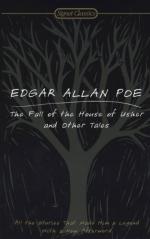|
This section contains 4,509 words (approx. 16 pages at 300 words per page) |

|
SOURCE: “‘Sympathies of a Scarcely Intelligible Nature,’: The Brother-Sister Bond in Poe's ‘Fall of the House of Usher,’” in Studies in Short Fiction, Vol. 30. No. 3, Summer, 1993, pp. 387-96.
In the following essay, May discusses sibling relationships in the context of nineteenth-century literature, citing “The Fall of the House of Usher” as a prophetic tale anticipating the collapse of a society that assumed the security of the family bond.
Matthew Arnold was in a distinct minority when, in 1853, he criticized the action of Sophocles's Antigone, saying that it “is no longer one in which it is possible that we should feel a deep interest.” Arnold finds that we moderns cannot use as a model “that which is narrow in the ancients, nor that with which we can no longer sympathize” (Arnold 12). Unfortunately, he thinks, such is the case with Antigone, “which turns on the conflict between a heroine's duty...
|
This section contains 4,509 words (approx. 16 pages at 300 words per page) |

|


